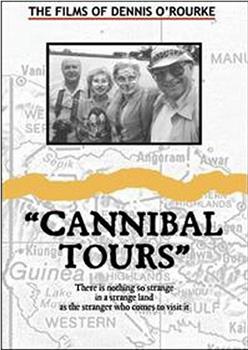食人之旅
Cannibal tours(1989)

- 豆瓣评分:
- 导演: Dennis O'Rourke
- 类型:纪录片
- 地区: 澳大利亚
- 上映时间: 1989-08-22
- 片长: 70分钟
介绍: WhentouristsjourneytothefurthermostreachesoftheSepikRiverinPapuaNewGui…… 更多食人之旅介绍
新小兵分享 暂时没有为您收集到播放资源!
《食人之旅》下载资源
抱歉!新小兵分享暂时没有为您收集到资源,请您继续关注!
《食人之旅》相关推荐
《食人之旅》剧情内容介绍
《食人之旅》在线观看和下载
剧情内容介绍
食人之旅原名:Cannibal tours,
When tourists journey to the furthermost reaches of the Sepik River in Papua New Guinea, is it the indigenous tribespeople or the white visitors who are the cultural oddity? This film explores the difference (and the surprising similarities) that emerge when "civilized" and "primitive" people meet. With dry humor and acute observation CANNIBAL TOURS explodes cultural assumption...
发布于1989年。由Dennis O'Rourke执导,并于1989-08-22公映的电影。
豆瓣评分7.8,算是一部中等偏上的电影作品,值得收藏看,推荐大家观看。类型为纪录片的电影。创作于澳大利亚地区,具有英语语言版本。
食人之旅资源介绍
新小兵分享暂时没有为您收集到在线或者下载资源,我们将会努力的寻找,请您继续关注。
豆瓣评分7.8,算是一部中等偏上的电影作品,值得收藏看,推荐大家观看。

这么多年的非凡 2024-09-23
感受到了白人强烈的高人一等 以及土著对于现代化的无助
迟到王 2020-06-25
“There is nothing so strange, in a strange land, as the stranger who comes to visit it.”想起在亚洲的类似情况。游客和当地人讲价,但当地人要进城买东西的时候没得讲价,他们口中的大城市从没有在片中展现,变成现代消费社会的背景。几次用到古典音乐都别有深意。开头的老伯伯说父辈第一次看到欧洲人以为是他们死去的祖先回来了,挺马尔克斯的
**锅贴 2019-05-19
其实是探讨了旅游凝视和遗产旅游中的话语问题 具体可以见After Cannibal Tours: Cargoism and Marginality in a Post-touristic Sepik River Society一文 不过文章的视角更上一层了
虾坨坨艺仔 2016-08-10
很有趣地记录了游客、原住民和纪录片本身的关系。然而在镜头之外,保留地将因为纪录片本身的诞生,而受到了现**明更强烈的冲击,从而进一步改变影片中记录着的世界。
如 2015-12-04
Biu! *到了人类学的痛处:colonialism—ethnography—trourism都是一回事...
披馬甲上陣殺敵 2014-03-20
Tourists reveal ethnocentrism. To see how natives' traditional value and lifestyle are shaped by ecotourism. Natives commodify their daily life, sacred culture in return of meaningless money. They bear the heaviest cost of change -- cultural exploitation
若汐 2013-06-21
文明与原始,运用多重视角(导演的、部落者的、旅行者的)描述眼中的“他者”。以为是讲述原始部落,实则讲述旅游者的故事。很有讽刺意味。"There is nothing so strange in a strange land, as the stranger who comes to visit it."
Left 2013-03-18
There is nothing so strange in a strange land, as the stranger who comes to visit it.
疾走 2013-02-15
二十多年前的片子 不知道现在的**人对外来者的看法是否还是一样 如果是 我不想去拜访 外来者是有错 把一些自然神圣的都破坏了 但不能因为外国人有钱就去expect他们在你们那里花钱 否则就充满愤怒
V_Lachesis 2011-12-16
O'Rourke's music and montage enlarge the ethnographic representative moment. The fine boundaries among time periods and countries are blurred and appear meaningless in the Other's eyes.